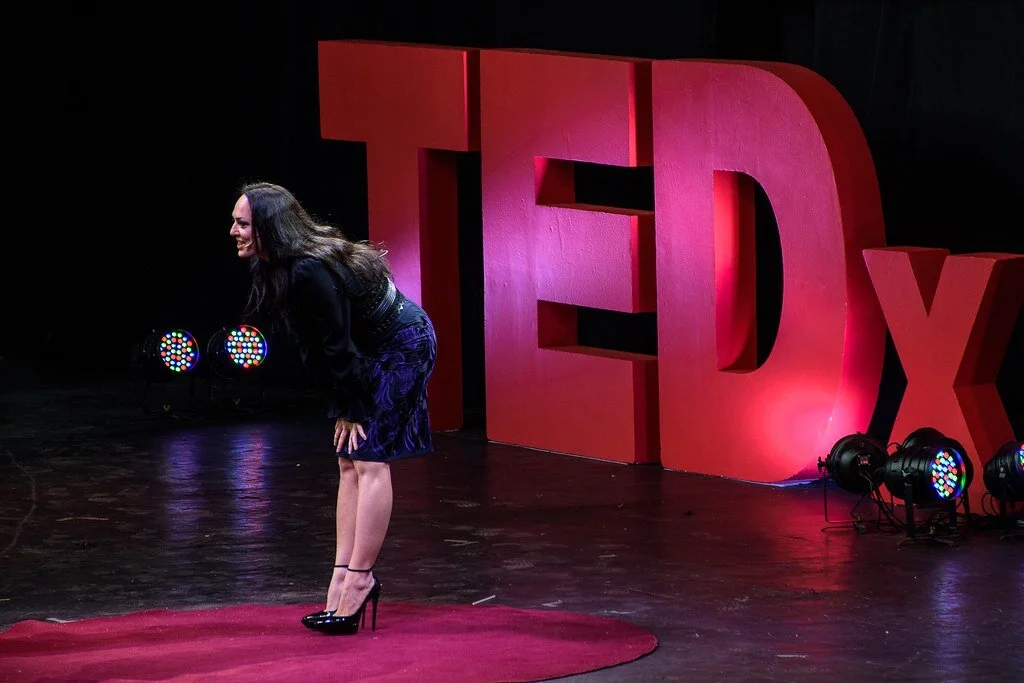Kasia's TEDx Talk: One Simple Trick to Reclaim Your Power
Kasia's TEDx Talk: One Simple Trick to Reclaim Your Power
This is a transcript of Kasia Urbaniak’s TEDx Talk, ‘One Simple Trick to Reclaim your Power’, delivered at TEDxRosario in October 2019.
Throughout centuries, women have been trained to give their power away. I teach women to claim their power. And tonight, I will show you how simple it can be to undo centuries of conditioning –with a question.
First let me tell you about a student of mine, Rachel.
So Rachel is delivering a presentation at work, and she is killing it. She is fantastic. She has the whole room eating out of the palm of her hand. It's one of those incredible days that she has been preparing for.
Every word she speaks is blossoming in the minds of the listeners. Every objection that comes to her, She meets with style. She shuts down manterruptors and mansplainers with grace.
Today is one of the best days of her life. Something very important in her career. Something very important for herself. It's a beautiful day, she's coming home she gets into the elevator of her apartment building and her neighbor starts to ask her questions: “Hey are you dating? My, you look fantastic in that skirt! Actually – you always look great. Have you thought about having children?”
And all of a sudden, she starts to grow very, very small. She doesn't know what to say. And that powerful woman in the meeting begins to vanish.
Another woman, Ursula, is negotiating a very painful divorce, so painful in fact that after she has finished advocating for her children she cannot ask for anything for herself – so much so that her attorney, her lawyer, is threatening to quit.
Her and her husband spent a lifetime building an enterprise together. And she won't ask for anything for herself.
That woman is my mother.
After the divorce. I watched her perform miracles as a single mother of two children living in New York City. She was unstoppable. Most of the time. Except in those situations, the same kind that Rachel faced in the elevator.
Every once in a while, a man – our landlord, my father, who is a good man, or a bus driver –would say something directly to her, and she would freeze. And I as a child would look at my mother and I could not recognize her. Where did my mother go? Paralyzed, speechless powerless.
The Freeze.
You know what I'm talking about? The freeze.
You know what I mean, it's that moment where you know you want to say something, you have to say something, you're not choosing silence, you're not choosing not to speak, you want to speak… you feel it coming up, you want to say something, you're saying: I'm gonna say it, I'm going to say it now, I'm going to say it now, ok! Three seconds, no five seconds...
Five seconds five!
And then the moment passes.
The moment passes, and a man's hand is up your skirt, or the promotion has gone to someone else.
The moment passes. Lifetimes pass us with things we left unsaid, with things we didn't say. Moments we didn't speak that had a profound impact on the rest of our lives.
Why is that?
There is a very, very important and very popular misconception about the freeze. We have this idea that women freeze when the stakes are really high: that women freeze when a job is on the line, or when a sexually inappropriate situation comes up – when it's life or death, but it's not true.
We don't just freeze when the stakes are high. Stakes have nothing to do with the freeze.
Rachel could have frozen at the meeting, but she didn't. She froze on her way home.
And what we fail to appreciate, is that so many women feel crazy because they cannot predict when they're going to freeze: high stakes, low stakes, elevator, big job.
We can't predict the moments where all of a sudden, we lose our voices, and we cannot advocate for ourselves.
After #metoo women were coming to my classrooms, and they were coming to me for the same reasons they always came to me.
Because after #metoo, there was a new permission.
It's not just about the bad things that happened. It's about the beautiful things that never happened. The beautiful ideas, the brilliant ideas. The life-changing conversations, the innovation of half the world's population.
So, for the freeze itself. There's a simple, fix-it trick: simple, but not easy. So here's how it goes: someone puts you on the spot. And you feel yourself freezing. And you have that moment where your attention is in on yourself, the ‘three, two, one…’ and you put your attention out and ask them a question.
That's it – ask them a question! And another one, and another one, if necessary. Ask them a question! So simple, right? That's it. Boom.
Except, picture this. I'm in a lecture hall of 600 women. And I tell all of them: I'm about to ask you some really inappropriate questions, really terrible questions. Are you ready?
[Audience shouts: Yes!]
That's what they say too!
Here's your job: when I asked you an inappropriate question, don't answer the question! Don't answer the question! Instead, ask me one back, put your attention on me and ask me a question.
Double points if you question my question. Triple points if you question my right to ask the question!
Great! Game on, here we go.
So we begin, and I go to the first woman and ask: do you like sex? And she goes, “Well…maybe…depends on who…” And the whole room laughs because she answered the question.
Okay, I give the instruction again: I’m going to ask you an appropriate question, and your job is to put your attention on me. Ask me a question back.
I go to the next woman and I say, “Why didn't you have children?” And she looks very uncomfortable. And she begins to talk about her life choices, and her fertility issues and suddenly, she stops. “I can't believe I didn't have to tell you all of that,” she says.
What's so crazy is that the conditioning is so strong, that even when I tell them not to answer the question, they freeze and comply – automatic response. Automatic response. And believe me, I've tried this with a roomful of men and they do not need the instructions. I ask them a question and they do not answer, and they definitely put me on the spot for asking!
Okay, so back to the lecture hall: fourth woman, fifth woman, they start to get it, they start asking me questions back, putting me on the spot, leaving me speechless. Great! Some responses are simple: why do you ask? Do you realize how you sound right now? Or…”What exactly can we do in your hotel room that we can't do right here, boss?”
They start getting the hang of it. So, practically speaking, there are two benefits to this.
Number one: the woman who is frozen, if she can get her attention out, and she can ask a question, she has a moment to breathe. If it's dangerous situation, this moment is exactly as much time as she needs to get the hell out of the room, where she has a moment to think about her next move.
The other benefit is that the other person has a chance to answer and to clarify where they're coming from, because not all men are predators, waiting for the next chance to take sexual advantage of a woman. But the real gift in this “turning the spotlight” and asking questions is that it reveals that when you direct the attention in a conversation, you control the conversation.
If you direct where the attention is in a conversation, she who has control over where the attention is has control over the conversation. What's talked about, for how long, when, and when it ends. So, if this first move of asking the question to the question can open such a powerful gateway, why does it take so long for women to learn it?
Welcome to the ancient conditioning of women.
From a very early age, women are trained to keep their attention on themselves. Now, I don't presume to know all of the differences between men and women. I'm not a scientist. But every single day, I'm faced with the consequences of how differently boys and girls are educated in terms of how to move through the world.
So let's take two kids, a boy and a girl,and let's call them Billy and Mary. Are Billy, and Mary rewarded for the same types of behaviors? No. No, they are not. From a very early age, when Billy's attention is out he is rewarded.
Look what Billy did! Look what Billy created! Look! Billy scored a goal. Billy built a fortress. Billy got into a fight. Whereas how do we reward Mary? We reward her when all of her attention is on herself and all of their attention is on her too. Look how lovely Mary is. Isn't she so sweet! What a lovely dress Mary is wearing. Is Mary getting chubby?
So boys begin to get rewarded for their agency, for what they do when their attention is out, whereas girls begin to get rewarded for how they are.
And this doesn't stop in childhood. Just think for a moment about how we talk about adults, like celebrities and politicians. Think about the difference in how we talk about the men and women.
For example, consider the last presidential election in my country, the United States. Before the election, this is how people were talking: “Yeah, so-and-so, him….Yeah, he's a real jerk but boy! He can get things done.”
And when they talked about the contending female politician, who had a long list of policy experience, a record of service, so many accomplishments – so many things done. What did they say about her? She's ‘unlikeable’. She's ‘not presidential’. She's too ‘abrasive’. She's ‘shrill’.
We are obsessed with what men do you have how women are.
Okay, so what does this have to do with communication? And what does this have to do with the freeze?
Let’s talk about this outward state of attention, the dominant state of attention. So leaders and teachers in a dominant state of attention have their attention outward – unless they're terrible leaders just barking orders. They have their attention out, they're looking to see how their instructions are landing. They're looking to see if their instructions are being followed. They're looking to their people – their students, their followers – and they're checking that they’re following by keeping their attention outward. Makes perfect sense, right?
Now for the submissive state of attention, the inward state of attention. If you've mastered this beautiful state, you not only feel and receive the instructions you are given, you're also deeply connected with your capabilities, with your desires and with who you are in that moment. You're deeply connected to yourself and what you’re capable of. Which state is better? Neither. Both serve a purpose, and in the best dynamics, there is a fluid switching between both dominant and submissive states.
Think about it. Think about a phenomenal conversation. The best kind of conversation that you have with a friend or a lover that keeps you awake until dawn. What's happening in those conversations, is that you're taking turns. Somebody's following, somebody’s leading, and you switch: you listen, you speak, you take turns.
And there's such a beauty and a flow in this fluid switching. It’s actually like a dance. And in this beautiful dance so many things can get created and generated. But very often our conditioning interrupts this dance. For example: two people in a dominant state of attention, what happens? They fight. Or they talk about the weather, so they don't fight. Or sports or politics.
Two people in a submissive state of attention? No connection. And then what happens in the freeze? Another way that the dance falls apart. All of his outward attention is on her, all of her inward attention is on herself, and she's nailed, she's stuck, she's fixed. She can't switch.
And he is getting no feedback. There's no way out. That's why turning the spotlight with a question is so powerful because it takes control of where the attention is.That's why it matters so much to be able to do this.
It's not about gender. It's about attention.
Now, we confuse power dynamics with gender dynamics, because we assume that masculine is dominant and feminine is submissive. But attention has no gender, it's neutral. It's neutral.
Remember, Billy? Remember Billy from earlier on, who we praised for all that he does? What happens to Billy when he cares, or cries? What happens to Billy when he decides to go inward?
We annihilate him. We destroy him. We say he's acting like a girl. We tell them to man up.
What are you really saying when you say: man up! What you're really saying is: override your inner experience, put your attention out and perform.
And for millennia, we've been asking men to do this for millennia, we've been asking men to cut off from some fundamental, inner part of themselves in order to be able to go out to war to kill for us, and to die for us.
The cost for women, the cost for men, and the cost for society has been enormous.
Because there's nothing masculine about putting your attention out and leading.
And there's nothing feminine about putting your attention in and knowing.
I'd like you to think about these two states – the dominant state and the submissive state of attention – like your right hand and your left hand. You need both of them, and you need to know how to use them and use them well.
But up until now, we've been asking men to cut off one hand, and women to cut off the other. And the result in terms of human communication has been catastrophic.
So think about this for a moment. Our world. Most of our world is created through communication. Specifically, through agreements made inside of conversations. Love laws, families, corporations, governments are all agreements, the nuclear family is an agreement, monogamy is an agreement, the justice system, the dictates of major religions, all agreements, even money is a collective agreement.
And most of these agreements were made in conversations without women present. And now, women are sitting at the table, we are able to be part of the conversation. But that's not enough. We have to change the way we have the conversation. That includes men, and that includes women.
Conversations are what made the rules and made this world that we live in.
A powerful conversation can change those rules, a powerful way of having a conversation can remake the entire world as we know it.
Thank you.
Welcome to The Academy – The School of Power for Women. Since 2013, hundreds of women have retrained the ‘good girl’ conditioning that for millennia has kept women silent. Today, we’re told to “use our voice” and “stand in our power” if we want to make change in the world. We teach women how.


